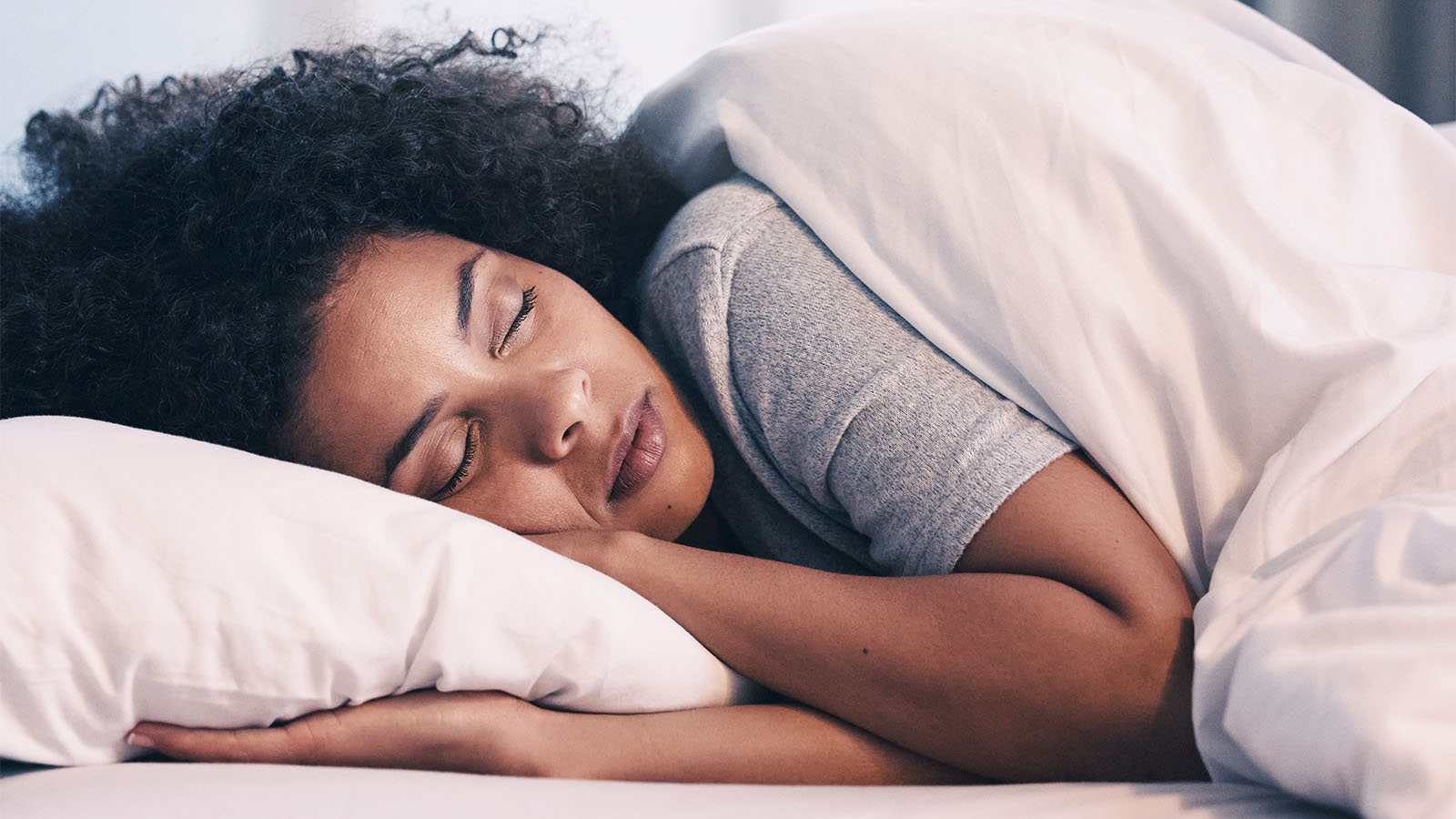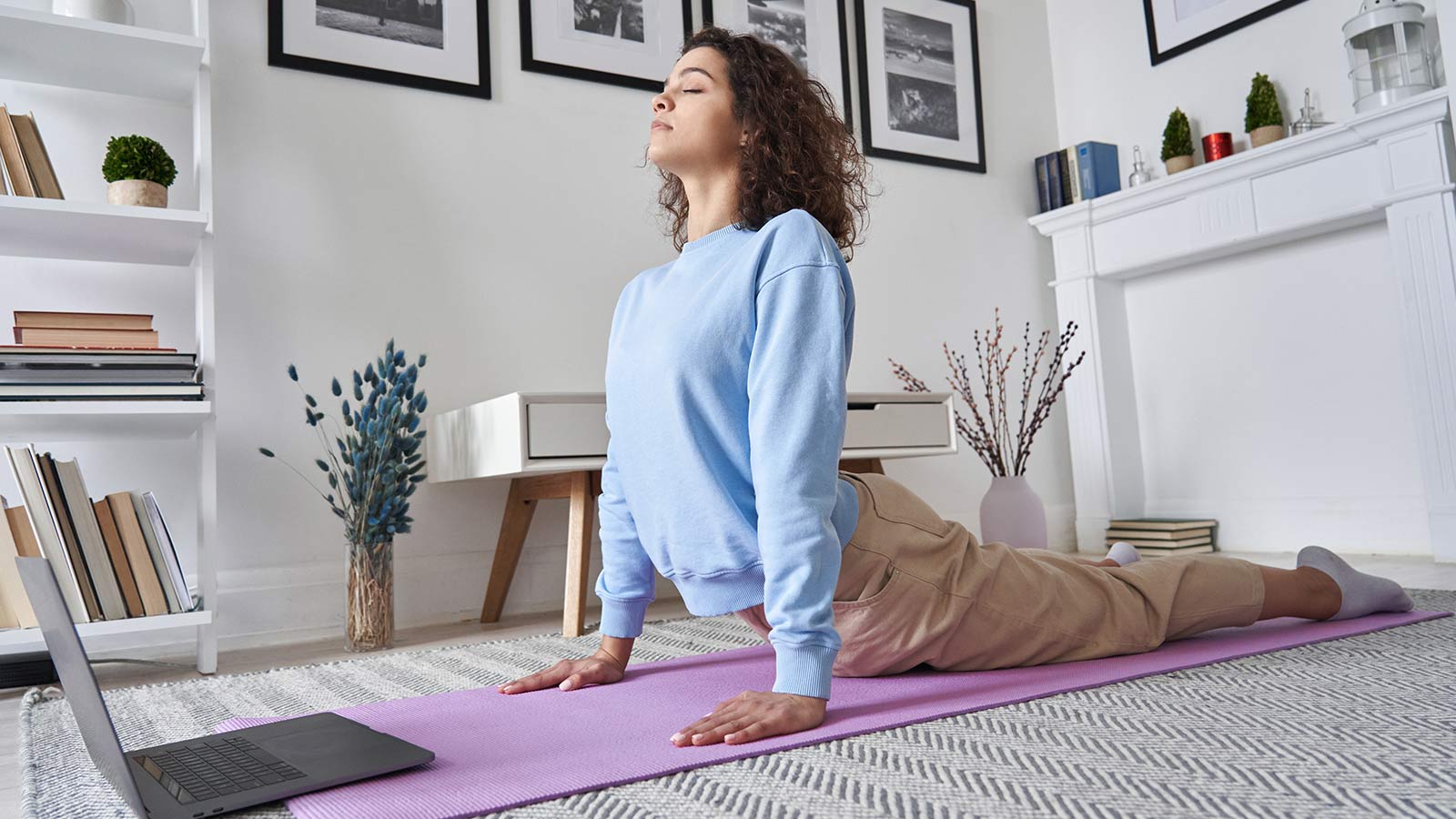Three Quick Shifts You Can Make Today to Prevent Knee Pain
Knee pain can get in the way of your favorite activities, making it difficult to keep up with an active lifestyle – so why not stop it before it starts? Here are three quick ways to fight back the most common causes of knee pain.

If it seems that more women suffer knee injuries, it’s because THEY DO. And it’s partly because of the great things that make us feminine – hormones and hips – that we suffer more. Here’s what you need to know to prevent knee pain.
The Female Knee
Estrogen is the primary female hormone and it also “makes our ligaments more lax or loose,” says Virtua orthopedic surgeon Laura Ross, DO.
Ligaments are stretchy bands of tissue that connect our bones to one another. They provide strength and stability to our knees. Because our ligaments are more lax, we need to be extra careful about the way we move our knees.
We also have to compensate for what doctors call our “Q” angle. This represents the angle formed by an imaginary line drawn from the top of the upper leg/outer hip down to the knee.
Once our hips first begin to widen during puberty, that’s when our Q angle increases and the mechanics of our knees change,” says Dr. Ross. “We are perhaps at greatest risk of injury when that change first takes place, which explains the recent focus on sports injuries in young female athletes. But these are also issues that women of all ages need to know about.”
Common Knee Ailments and Injuries
The three women’s knee issues that Dr. Ross sees most frequently in her practice are:
- Chondromalacia patella - This condition occurs with overuse or injury to the cartilage directly under your kneecap. “You may hear a pop, crack, or other funny noise when you bend, walk, or climb stairs,” says Dr. Ross. “This can occur with or without pain, but even if it doesn’t hurt, it is an early warning sign and it might get worse.” The best way to treat or prevent this condition is to strengthen the quadriceps muscles.
- Meniscal injuries - The menisci are two small pieces of cartilage that absorb shock inside your knee. “Meniscal injuries occur when your foot is planted and you twist to a degree that causes a tear,” says Dr. Ross. “These injuries usually cause intense, deep-seated pain inside the knee.” Depending on the location of the tear, it’s possible for a meniscal injury to heal on its own. But certain parts of the menisci don’t have sufficient blood supply to self-heal. Physical therapy, a knee brace, or anti-inflammatory medication may aid with healing; in more severe cases, surgery is advised.
- Runners knee (iliotibial band syndrome) - For female runners and walkers who cover serious mileage each week, iliotibial band syndrome (ITBS) is an all-too-common foe. “The iliotibial band is a tendon that comes from the hip and attaches to the outer side of the knee,” explains Dr. Ross. “If it’s not stretched properly before exercise, it can become inflamed, possibly causing such pain that you may not feel able to run or walk at all.” Once you’ve developed ITBS, you will most likely need physical therapy and/or anti-inflammatory medication to recover. But it can often be prevented through adequate warm up/cool down and proper shoe wear.
Preventing Knee Issues
Paying special attention to three simple steps can go a long way toward preserving healthy knees:
- Stretching - Every expert we’ve ever interviewed has emphasized the importance of stretching before your workout: Dr. Ross is no exception.
- Proper Body Mechanics - If you lift weights and work out with machines at a gym you might choose ‘closed chain’ exercises (as opposed to ‘open chain’ exercises) to try to avoid knee injury,” advises Dr. Ross. In a closed chain exercise for the legs, your foot will be continually pressed against a firm surface for the duration of the movement. “And if you are doing squats or lunges, you must take special care not to bend your knees past 90 degrees.”
- Footwear - Don’t skimp on your sneaks: According to Dr. Ross, you should replace your exercise footwear every 6 months, at minimum. Replace it more often if you’re a daily distance runner or walker. They don’t need to be expensive shoes, but they do need to be comfortable and supportive.
Don't Let Pain Bring You to Your Knees.
Practicing proper knee care is vital, but if you’ve been experiencing persistent pain that’s keeping you from doing what you love, it might be time to consult with a doctor. Our specialists at Virtua Orthopedics & Spine provide comprehensive, compassionate care at a location near you in South Jersey. Learn more about our knee pain services, or call 856-517-8812 to speak with a specialist today.
There's So Much More to Explore
Discover expert insights, inspiring stories, health tips, and more by exploring the content below!

COPD vs. Asthma: Understanding the Difference in Symptoms

Bioidentical Hormone Replacement Therapy Pellets: Relief for Menopause and Andropause Symptoms

Why Is Sex Painful During Pregnancy? Pelvic Congestion Syndrome Explained

Don't Drink Alcohol? You Could Still Get Fatty Liver Disease

What Is the Difference Between Palliative Care and Hospice Care?

How to Exercise Safely with Asthma: Tips, Triggers, and Rescue Inhaler Use

How to Relieve Bloating Fast: Simple Tips for Quick Comfort

How to Tell the Difference Between Cold, Flu, and COVID-19

Jill Travels From Delaware to South Jersey for Advanced Lung Care

4 Exercise Tips to Help You Reverse High Blood Pressure

From Exhaustion to Empowerment: Tracy's Hormone Replacement Therapy Success Story

Why on Earth Am I Always So Cold?

Timely Heart Care During a Heart Attack Helps Joe Feed the Community

Allegra Is Thriving With Crohn's Disease

The Best and Worst Foods for Acid Reflux

How to Manage IBS Symptoms and Feel in Control Again

5 Types of Lung Disease: Symptoms, Causes, and Prevention Tips

Foods to Enjoy and Avoid for GLP-1 Heartburn

3 Reasons Why Now's the Time to Find Relief From Varicose Veins

Baseball Coach Turns Male Breast Cancer Surprise into Personal Mission

The Brain Health Checklist: 11 Questions Everyone Should Ask

From Caregiver to Patient: Robotic Surgery Relieves Teresa's Knee Pain

How to Get and Stay Healthy This Fall

How to Reverse Prediabetes and Prevent Type 2 Diabetes

Young Breast-Cancer Survivor Has New Hope for Healthy Future

Is Cancer Hereditary? What You Need to Know About Your Genetic Risks

Tara's Story: From Debilitating Uterine Fibroid Pain to a Half-Marathon Medal

Is Your Post-Pregnancy Belly Bulge a Sign of Diastasis Recti?

Is Your Daily Walk Making You Really Sore?

IBS and Alcohol: Can You Still Enjoy a Drink?

Focus on Mental Health Is Key Part of Andrew's Weight-Loss Journey

What You Need to Know About Epilepsy

'Feeling Joy Again': ECT Brain Stimulation Therapy Restores Ashley's Well-Being

Not Just for Wrinkles: Botox Injections Promote Improved Bladder Control

How to Stay Cool and Prevent Heat Illness All Summer Long

What Happens to Your Body When You Don't Get Enough Sleep?

5 Key Facts About Proton Therapy for Cancer Treatment

Mood Swings vs. Mood Disorders: Know the Signs and Get Help
Are emotional ups and downs disrupting daily life? Learn common signs of mood disorders, and when to talk to a doctor about diagnosis and treatment options.

4 Foolproof Pelvic Floor Strengthening Exercises for Women

What to Expect During Perimenopause

Protect Yourself From Tick Bites and Lyme Disease

6 Tips to Tame Your Spring Allergies

Do You Know the Signs and Symptoms of Uterine Fibroids?

How Are Uterine Fibroids Treated?

How Can I Prevent Bone Loss and Osteoporosis?

Is an At-Home Colon Cancer Test a Good Alternative to a Colonoscopy?

How Do You Manage the Side Effects of Weight-Loss Medications?

A Woman’s Four-Step Guide to Fight Back on Back Pain

What You Need To Know About Carpal Tunnel Syndrome

The Truth About Menopause, Weight Gain, and Belly Fat

Shedding Light on Lesser-Known Menopause Symptoms and Solutions

Debunking The Myths About Vaginal Dryness
Inside Look at Blood Vessels Aids PAD Treatment
Denise Davis: Pay Attention to Your Heart Health

What You Need To Know About Stroke Treatment

10 Smart Ways to Manage Your Diabetes

Signs You May Have Chronic Kidney Disease

5 Essential Winter Foot Care Tips When You Have Diabetes

Sweet Music: Trust, Teamwork Save Justin from Heart Attack

Complex Heart Surgery Nets James a Lifelong Friend

Hepatitis C Kidney Transplant a Blessing For Lee Manns

7 Reasons Why You Want Your Surgeon to Be an Expert in Robotics

Colitis Symptoms Under Control, Jennifer Is ‘Living My Best Life’

How Do I Care for a Wound that Won't Heal?

Five Back Pain Risk Factors That You Should Know

Is My Back Pain Normal, or Is It Spinal Stenosis?

Robotic Hernia Surgery Combines Innovative Techniques With Faster Recovery Times

How Does Breast Density Affect Your Mammogram?

Menopause: New Insights Into the Power of Hormone Replacement Therapy

Signs You Should Get Treated For Vein Problems

One New Heart Valve Saves Two Lives in the Tritten Family

What You Need to Know About Heart Failure
Lung Valve Surgery Relieves COPD, Emphysema Symptoms

4 Easy Ways to Treat and Prevent Runner's Knee

Lung Screening, Robotic Technologies Get Pat Kicking Up Her Boots Again

Breast Cancer Diagnosis Inspires Catherine to Help Others

Jasmine’s On-Air and Pain-Free After Gallbladder Surgery

When Should I See a Doctor About My Knee Pain?

Quick Action Leads to Jesse's Recovery From Stroke

A Non-Athlete’s Guide to Shoulder Overuse Injuries
Shoulder problems aren’t limited to athletes. Virtua orthopedic surgeon Sean McMillan, DO, explains shoulder overuse injuries and prevention in this article.

Put Lower Back Pain Behind You With This Ten-Step Guide

Wide-Awake Hand Surgery Speeds Recovery, Puts Control in Patients' Hands

South Jersey Veteran Thrives After Cross-Country Kidney Donation

3 Ways to Avoid Knee Pain

When Should I See a Doctor for My Hip Pain?

When Should I See a Doctor About My Shoulder Pain?

Is My Back Pain Normal, or Is It Sciatica?

Is My Back Pain Normal, or Is It a Herniated Disk?

When Is It Back Pain, and When Is It Something More?

Watchman Heart Device: a Technological Breakthrough for Blood Clot Prevention

Albert's Emergency Cardiac Surgery Is a 'Story of a Lifetime'

What Can I Do Right Now About My Aching Back?

How Do I Get Rid of This Back Pain for Good?

Can Your Gut Health Affect Your Heart?

When Should I Be Worried About My Neck Pain?
Advanced Heart Failure Therapies Get Bernadine Back to Full Speed

Sarah Wins Back Her Health After Crohn's Disease Diagnosis

Overcoming Addiction, Philip Now Sees More Positive Side to Life
Firefighter's Successful Lung Cancer Care at Virtua
A Lung Screening Put Teresa Back in the Race

A Breast Self-Exam Saved Kristen's Life

Early Treatment is Best to Relieve Hemorrhoid Symptoms

The Top 10 Foods For A Healthy Diabetes Diet

Keeping the Beat: Advanced Heart Surgery for Aortic Aneurysm

Are You At Risk For Chronic Kidney Disease

Local Pastor Makes Kidney Health Mission of Ministry

What’s the Difference Between Type 1 and Type 2 Diabetes?

All for Bear: Dan Loses Weight to Be His Son’s Kidney Donor

Augmented-Reality Surgery Has Bobby Back on Stage, Rocking His New Hip

Hyperbaric Wound Therapy Puts Joette Back in Motion

Robotic Hernia Repair Renews David's Active Lifestyle

